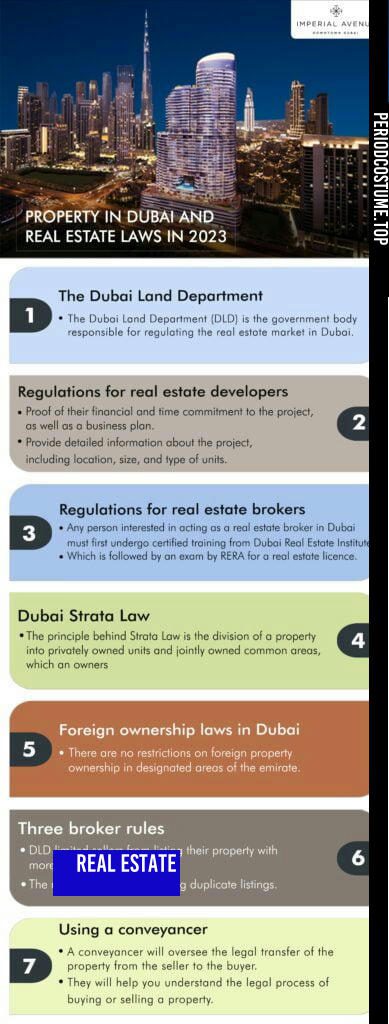Understanding Real Estate Laws in Dubai
Welcome to an insightful guide on understanding real estate laws in Dubai. Whether you are a homeowner, tenant, or investor, navigating the legal landscape of property ownership in Dubai can be a daunting task. With regulations constantly evolving, it is crucial to stay informed and knowledgeable about your rights and obligations. From property registration to tenancy laws, this article will shed light on the key aspects of real estate laws in Dubai to help you make informed decisions and protect your interests.
Overview of Real Estate Laws in Dubai
Real estate laws in Dubai play a significant role in regulating the property market and ensuring the protection of both buyers and sellers. These laws are designed to create a fair and transparent environment for all parties involved in real estate transactions. Here are some key points to understand about real estate laws in Dubai:
First and foremost, the real estate market in Dubai is governed by a set of regulations issued by the Dubai Land Department. These regulations cover a wide range of issues, including property ownership, leasing, and development. The Dubai Land Department is responsible for overseeing all real estate transactions in the emirate and ensuring compliance with the laws and regulations.
One of the most important laws in Dubai’s real estate market is Law No. 13 of 2008, also known as the Real Estate Regulatory Agency (RERA) law. This law establishes the regulatory framework for the real estate sector in Dubai and sets out the rights and obligations of buyers, sellers, and developers. RERA is tasked with licensing and regulating real estate brokers, property developers, and property management companies to ensure that they operate in accordance with the law.
Another key law in Dubai’s real estate market is Law No. 7 of 2006, which governs the ownership of property by non-UAE nationals. Under this law, foreign nationals are allowed to own freehold property in designated areas of Dubai, subject to certain conditions and restrictions. Foreign nationals can also own leasehold property in other areas of Dubai for a period of up to 99 years.
In addition to these laws, there are specific regulations that govern different aspects of the real estate market in Dubai. For example, there are regulations that set out the procedures for registering property transactions, resolving disputes between buyers and sellers, and regulating the conduct of real estate agents and brokers. These regulations are designed to ensure that all parties involved in real estate transactions are protected and that the market operates smoothly and efficiently.
Overall, the real estate laws in Dubai are designed to protect the rights of all parties involved in real estate transactions and promote transparency and stability in the property market. By understanding and complying with these laws, buyers, sellers, and developers can ensure that their rights are respected and that their transactions are conducted in a fair and lawful manner.
Property Ownership Rights in Dubai
When it comes to property ownership rights in Dubai, there are a few key things that individuals need to be aware of. In Dubai, foreign nationals are allowed to own freehold property in certain designated areas. This means that they have full ownership rights over the property, including the land it sits on, and can sell, lease or rent it out as they see fit. This is a major advantage for expatriates looking to invest in real estate in Dubai, as it provides them with a sense of security and control over their investment.
Additionally, Dubai has established a robust regulatory framework to protect the rights of property owners. The Real Estate Regulatory Authority (RERA) oversees the real estate market in Dubai and ensures that developers, real estate agents, and property owners comply with the applicable laws and regulations. This includes regulations related to the registration of property, escrow accounts for off-plan projects, and strata regulations for jointly owned properties.
One important aspect of property ownership rights in Dubai is the concept of strata ownership. Strata ownership applies to properties that are part of a larger development, such as apartment buildings and gated communities. In these cases, each individual owner holds a share of the common areas of the building or complex, in addition to their own unit. This system helps ensure that common areas are properly maintained and managed, and that owners have a say in how their shared property is run.
It is worth noting that property ownership rights in Dubai are subject to certain restrictions and limitations. For example, in areas where freehold ownership is not allowed, non-UAE nationals can only purchase leasehold property, which grants them the right to use the property for a set period of time. Additionally, there are restrictions on the types of properties that foreign nationals can own, with some developments reserved exclusively for UAE nationals.
Overall, property ownership rights in Dubai offer a favorable environment for investors and residents alike. With a clear legal framework, robust regulatory oversight, and the ability for foreign nationals to own freehold property in certain areas, Dubai continues to be an attractive destination for real estate investment.
Regulations for Foreign Investors in Dubai Real Estate Market
Foreign investors looking to invest in the Dubai real estate market must adhere to specific regulations set by the government to ensure transparency and protect the interests of both buyers and sellers. These regulations help maintain a stable and thriving real estate sector in Dubai.
Firstly, foreign investors are required to obtain a residency visa in order to purchase property in Dubai. This visa allows investors to stay in the country for an extended period and gives them the right to own property. The process of obtaining a residency visa involves submitting various documents to the Dubai Land Department, such as a valid passport, proof of income, and a completed application form. Once approved, investors can then proceed with purchasing property in Dubai.
Additionally, foreign investors are subject to certain restrictions when it comes to owning property in specific areas of Dubai. The government has set regulations on the types of properties that can be purchased by foreign investors, as well as the maximum percentage of ownership allowed. This helps prevent over-speculation in the real estate market and ensures that properties are not concentrated in the hands of a few individuals.
Foreign investors looking to sell their property in Dubai must also follow regulations set by the Dubai Land Department. This includes paying any applicable taxes on the sale of the property and ensuring that all necessary documentation is in order. Failure to comply with these regulations can result in fines or other legal consequences.
Furthermore, foreign investors are encouraged to seek the assistance of a reputable real estate agent or broker when navigating the Dubai real estate market. These professionals can provide valuable insights and guidance on the best investment opportunities available, as well as help investors navigate the legal and regulatory processes involved in purchasing property in Dubai.
Overall, the regulations for foreign investors in the Dubai real estate market are in place to protect the interests of all parties involved and ensure a fair and transparent real estate sector. By following these regulations, foreign investors can confidently invest in the Dubai real estate market and reap the benefits of owning property in one of the most dynamic and thriving real estate markets in the world.
Commercial Lease Agreements in Dubai
Commercial lease agreements in Dubai are governed by the Dubai Real Estate Laws and Regulations. These laws outline the rights and responsibilities of both landlords and tenants when entering into a commercial lease agreement. The laws aim to provide a fair and transparent framework for leasing commercial properties in Dubai.
When entering into a commercial lease agreement in Dubai, it is important for both parties to understand their rights and obligations. The lease agreement should clearly outline the rent amount, payment schedule, duration of the lease, maintenance responsibilities, and any additional charges or fees. It is important for both parties to read the lease agreement carefully and ensure that they agree with all terms before signing.
In Dubai, commercial lease agreements are typically for a fixed term, usually ranging from 1 to 5 years. During the term of the lease, the landlord is responsible for maintaining the property and ensuring that it is in a good condition for the tenant to operate their business. The tenant, on the other hand, is responsible for paying the rent on time and adhering to any rules or regulations outlined in the lease agreement.
If either party breaches the terms of the commercial lease agreement, the other party has the right to take legal action. For example, if the tenant fails to pay rent on time, the landlord can issue a notice of eviction and seek legal recourse to recover any outstanding rent. It is important for both parties to familiarize themselves with the Dubai Real Estate Laws and Regulations to understand their rights and obligations in case of any disputes.
It is recommended for both landlords and tenants to seek legal advice before signing a commercial lease agreement in Dubai. A legal professional can review the lease agreement and ensure that it complies with the Dubai Real Estate Laws and Regulations. They can also provide guidance on how to resolve any disputes that may arise during the term of the lease.
In conclusion, commercial lease agreements in Dubai are governed by the Dubai Real Estate Laws and Regulations to ensure a fair and transparent leasing process for both landlords and tenants. It is important for both parties to understand their rights and obligations before signing a lease agreement and to seek legal advice if needed.
Legal Procedures for Property Disputes in Dubai
When it comes to dealing with property disputes in Dubai, there are specific legal procedures that must be followed in order to resolve the issue. Whether it’s a disagreement over ownership, tenancy agreements, or construction defects, knowing the correct legal steps to take can make a significant difference in the outcome of the dispute. Here are some essential steps to consider when facing a property dispute in Dubai:
1. Consult with a Legal Professional: The first and most crucial step in resolving a property dispute is to seek advice from a qualified legal professional in Dubai. A lawyer specializing in real estate law will be able to assess your situation, provide you with expert guidance, and represent your interests in any legal proceedings.
2. Attempt Mediation: Before resorting to litigation, parties involved in a property dispute in Dubai may be required to attempt mediation. This involves meeting with a neutral third party who will assist in facilitating a resolution between the conflicting parties. Mediation can often be a more cost-effective and timely way to resolve disputes compared to going to court.
3. File a Complaint with the Dubai Land Department: If mediation proves unsuccessful, the next step is to file a formal complaint with the Dubai Land Department. This government entity oversees property registration and regulation in Dubai and can assist in resolving various property-related disputes.
4. Consider Arbitration: In some cases, parties may choose to resolve their property disputes through arbitration instead of going to court. Arbitration is a private and formal process where an impartial arbitrator hears both sides of the case and makes a binding decision to resolve the dispute.
5. Prepare for Litigation: If all previous attempts to resolve the property dispute have failed, the final option is to take the matter to court. This involves filing a lawsuit with the Dubai courts and presenting your case before a judge. It’s essential to gather all relevant evidence, documentation, and witnesses to support your claims.
6. Attend Court Hearings: Once the lawsuit is filed, both parties will have the opportunity to present their arguments in court. It’s crucial to attend all scheduled hearings and comply with any court orders or directives throughout the litigation process. The court will ultimately make a decision on the property dispute based on the evidence presented and applicable laws.
7. Enforce a Court Judgment: If the court rules in your favor, the next step is to enforce the judgment against the opposing party. This may involve obtaining a court order for compensation, eviction, or other remedies to resolve the property dispute.
By following these legal procedures for property disputes in Dubai, individuals can navigate the complex legal landscape and work towards a resolution that protects their rights and interests. Seeking professional legal advice and being prepared for all possible outcomes are essential aspects of successfully navigating a property dispute in Dubai.
Originally posted 2025-10-13 07:26:00.







